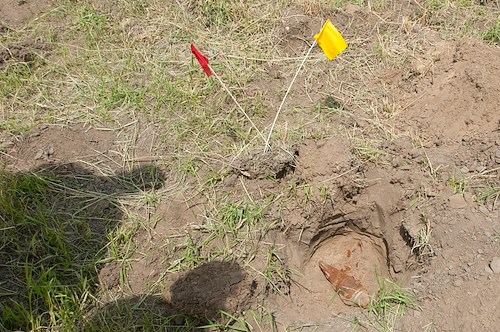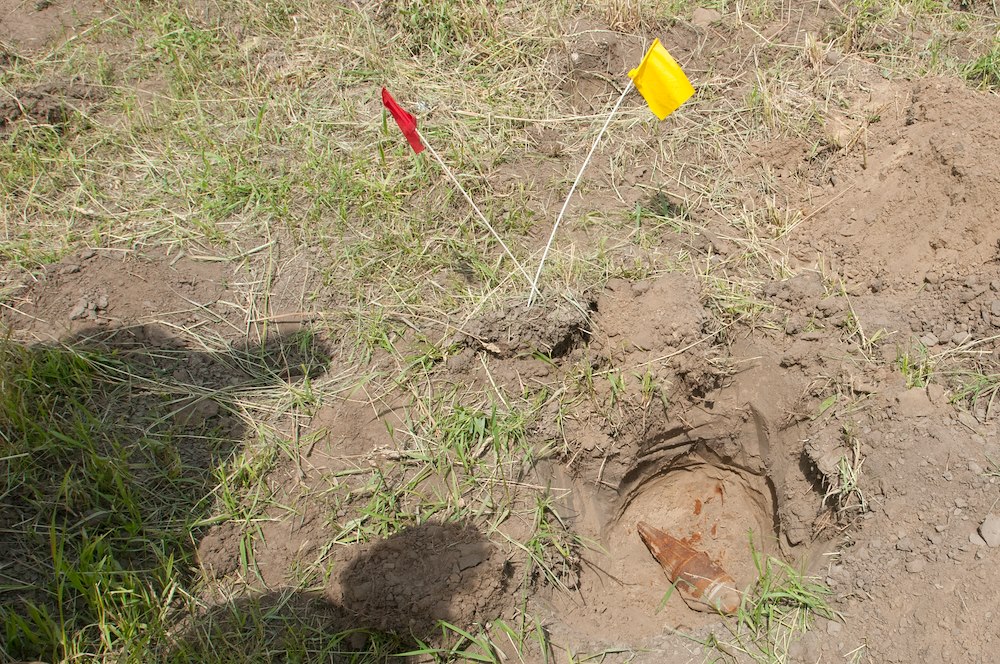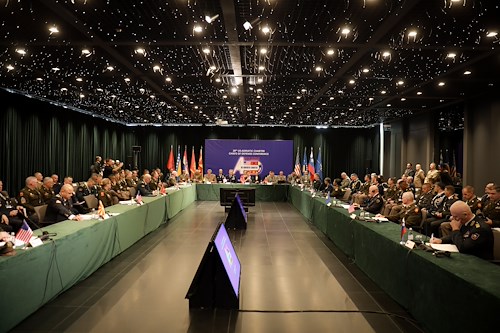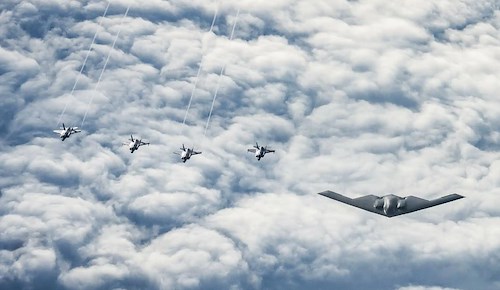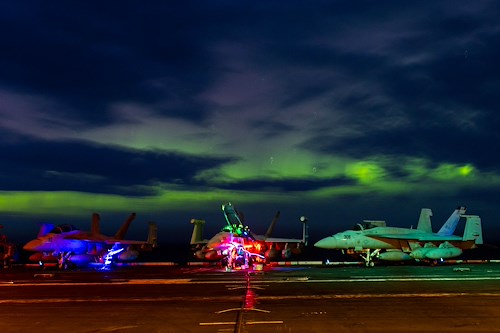Gallery contains 3 images
×
Photo 1 of 3
Clearing the way for progress in Ukraine
Different colored flags are used to mark off areas that have been cleared of unexploded ordinance and areas that still need to be cleared at the Yavoriv Combat Training Center on the International Peacekeeping and Security Center near Yavoriv, Ukraine.
Range improvement operations are currently in progress to clear several areas on the IPSC of UXO. Four civilian demining teams, contracted by the U.S. Army through the Joint Multinational Training Group-Ukraine, are working toward the goal of clearing 1,800 hectares of UXO by 2018. (Photo by 1st Lt. Kayla Christopher, 45th Infantry Brigade Combat Team)
Photo by: 1st Lt. Kayla Christopher
Photo 2 of 3
Clearing the way for progress in Ukraine
Maj. Christopher Watson, 45th Infantry Brigade Combat Team and Joint Multinational Training Group-Ukraine range operations officer, and Capt. Montana Dugger, 45th IBCT and JMTG-U engineer, evaluate the progress that has been made toward clearing areas of unexploded ordinance at the Yavoriv Combat Training Center on the International Peacekeeping and Security Center near Yavoriv, Ukraine on June 16.
Range improvement operations are currently in progress to clear several areas on the IPSC of UXO. Four civilian demining teams, contracted by the U.S. Army through the JMTG-U, are working toward the goal of clearing 1,800 hectares of UXO by 2018. (Photo by 1st Lt. Kayla Christopher, 45th Infantry Brigade Combat Team)
Photo by: 1st Lt. Kayla Christopher
Photo 3 of 3
Clearing the way for progress in Ukraine
A warning sign marks an impact area at the Yavoriv Combat Training Center on the International Peacekeeping and Security Center near Yavoriv, Ukraine.
Range improvement operations are currently in progress to clear several areas on the IPSC of unexploded ordinance. Four civilian demining teams, contracted by the U.S. Army through the Joint Multinational Training Group-Ukraine, are working toward the goal of clearing 1,800 hectares of UXO by 2018. (Photo by 1st Lt. Kayla Christopher, 45th Infantry Brigade Combat Team)
Photo by: 1st Lt. Kayla Christopher
YAVORIV, Ukraine—Over the course of the last century, six different flags have flown over what is now the Yavoriv Combat Training Center on the International Peacekeeping and Security Center, near Yavoriv, in modern-day Ukraine.
Each time a new nation laid claim to the land, the military training site was expanded, sometimes violently.
“People were deported from the surrounding villages. Churches, cemeteries and other historical and cultural sites were removed,” explained Stepan Korniienko, the IPSC historian. “Some sites, like St. Michael's Church in the village of Velyka Vyshenka, were used as targets for artillery.”
The idyllic countryside of Western Ukraine still bears the scars of its war-torn past. Leftover mines, duded artillery shells and other unexploded ordinance, commonly referred to as UXO, dot the area.
However, today NATO partners and allies are hard at work clearing the way for progress in Ukraine.
Four civilian demining teams, contracted by the U.S. Army through the Joint Multinational Training Group-Ukraine, are working toward the goal of clearing 1,800 hectares of UXO by 2018.
The mission of the JMTG-U, an international coalition composed of U.S. Soldiers from the 45th Infantry Brigade Combat Team along with Canadian, British, Polish and Lithuanian service members, is to build the training capacity of the Ukrainian army by growing the Yavoriv CTC.
The Yavoriv CTC is modeled after NATO standard CTCs such as the 7th Army Training Command’s Joint Multinational Readiness Center in Hohenfels, Germany. Range improvement projects, such as the demining operation, increase the CTC’s capacity by salvaging safe maneuver training space from what was once unusable land.
Currently, due to safety hazards presented by the UXO, NATO forces can only use a portion of the training space available on the IPSC.
“This project will enable us to eventually do force on force training for a brigade tactical group sized element, which is the goal here,” said Capt. Montana Dugger, the 45th IBCT and JMTG-U engineer who is overseeing the project.
The UXO removal will allow NATO units to use the entire base, which was first formally established under the Soviet Union in 1940.
In the early 20th century, the area where the IPSC exists today and much of Western Ukraine belonged to the Austro-Hungarian Empire. During this time, the Austro-Hungarian military used a small portion of the area for training and many skirmishes between the Austro-Hungarian Empire and Russian Empire erupted over the territory, Korniienko explained through a translator.
In 1920, Poland claimed the region and used the ranges for their own troops, but once WWII broke out, the area traded hands again, this time between the Soviet Union and Germany.
During this tumultuous time, the military base was used both for training troops and for detaining prisoners of war—Soviet prisoners of war from 1941 to 1944 and then German prisoners of war from 1944 to 1951, the historian explained.
Much of the UXO present on the training area today is from the WWI and WWII era.
When Ukraine gained its independence in 1991, the training area became the property of the newly sovereign state. The IPSC was established in 2007 and, under the mentorship of JMTG-U personnel, the Yavoriv CTC was established in 2015.
Presently, approximately 100,000 square meters have been cleared of UXO and about 7,000 square meters more are cleared each day, said Dugger.
“That only represents about one percent of the total area to be cleared,” Dugger explained. “But, at completion, this project will basically double the usable training space.”

